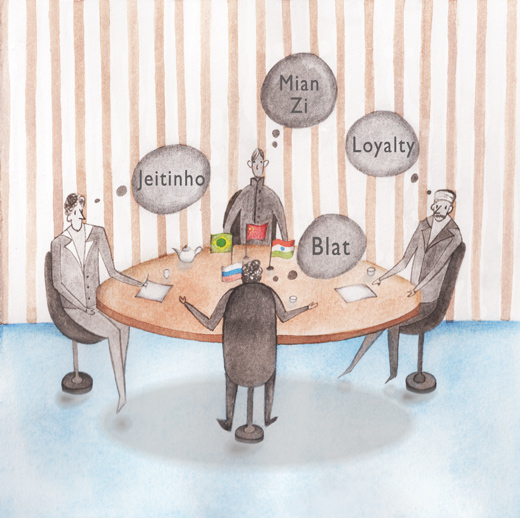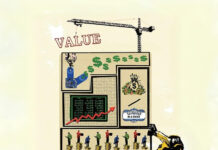As the economies of Brazil, Russia, India, and China (BRICs) continue to grow both in size and clout, and their resident multinational corporations become major players in global markets, questions pertaining to trust and integrity, and of universally shared standards for ethical business behavior become important concerns for numerous stakeholders. Whether or not managers and employees behave ethically depends on how one defines ethical behavior and applies it to an organization’s culture. We start this article by discussing attributes of ethical business behavior and cultures in each of the four BRICs countries, and then present results of our recent large scale survey-based studies, comparing managers’ and employees’ perceptions of ethical cultures in BRICs and in economically developed Western economies.
Scanning the Global Environment
Issues of managing corporate culture have long been among central concerns to executives around the world.1 In recent years, the discussion of ethical corporate cultures came to the forefront. Among the reasons for this growing interest was the realization that the global financial and economic crisis of 2008-2009 was triggered, among other things, by major ethics violations at large multinational corporations and financial institutions; and that, while the negative impact of business activity on the global ecosystem and local communities is rapidly escalating, corporations governed by questionable cultures of ethical behavior are much more likely to behave in irresponsible and unsustainable ways. The importance of promoting ethical cultures in large business organizations from BRICs (Brazil, Russia, India, and China) cannot be overstated: it is projected that by 2050 the combined GDP of these four countries will be larger than that of the G7 (seven largest developed economies of the world), and multinationals from BRICs are already playing a major role in shaping the way business is done globally.
[ms-protect-content id=”9932″]
Business Cultures and Ethics
Edgar Schein2 a leading authority in organizational psychology, believes organizational culture is a pattern of learned responses where “basic assumptions and beliefs that are shared by members of an organization…define in a basic ‘taken-for-granted’ fashion an organization’s view of itself and its environment.’’ Culture is bifurcated into formal and informal elements. Formal elements include codes of ethics, mission statements, reward systems, and decision processes. Informal elements include implicit norms of behavior, stories, rituals, and role models. Ethical business cultures are “based on alignment between formal structures, processes, and policies, consistent ethical behavior of top leadership, and informal recognition of heroes, stories, rituals, and language that inspire organizational members to behave in a manner consistent with high ethical standards that have been set by executive leadership.”3
Business Cultures and Ethics in BRICs
Brazil. Brazilian managerial culture is characterized by paternalism (defined as a relationship between superiors and their subordinates, in which superiors provide protection and guidance in exchange for loyalty and deference on the part of subordinates), power concentration, personal relationships, strong loyalty to one’s in-group and leader, and flexibility.4 Organizational ethics in Brazilian businesses is based on the preference for social cohesion, which is cemented by employee loyalty to the group leader. The leader, on the other hand, is responsible for group members’ well-being. This web of reciprocal obligations could result in both positive and negative outcomes. On the positive side, it can lead to high performance of individual employees if they feel loyalty to the group and the leader. However, such loyalty can be accompanied by an excessive fear of making damaging mistakes by the group that can result in a reduction in creativity and innovation.
In Brazil the cultural trait that has the greatest impact on business culture is jeitinho (a middle path between what is allowed by numerous laws and regulations, and what is practically possible and makes sense). It emerged as an adaptation mechanism which allows individuals and businesses to function despite the rigid legislative environment, massive bureaucracy, paternalistic management systems, and the oligarchic economic structure, dominated by powerful hereditary clans.5
As an indicator of the growing relevance of business ethics in Brazil6 the corporate sustainability index (ISE) of the Sao Paulo Stock Exchange (BOVESPA) has been introduced. In addition, a recent nationwide survey of 189 organizations out of the top 500 companies operating in Brazil explicitly adopted corporate codes of ethics.7
In summary, the Brazilian business culture is as diverse as the socio-cultural environment of this dynamic country. Such elements as loyalty and flexibility, personal relationships and jeitinho, exist side-by-side with Western-style codes of ethics and formal ethics programs.
Russia. An analysis of business ethics in post-Communist Russia suggests that the universalist rule-based ethics, central to the Western market economies, failed to develop despite radical economic reforms of the last two decades. Business behavior is based more on considerations of personal loyalty and in-group allegiances, than on universal considerations of right and wrong, or of potential impact on community and society.8 Recent studies suggest that compared to Western managers, Russians tend to display higher reliance on personal networks rather than on legal contracts, and have lower degree of respect for private property and higher tolerance of corruption. Another important issue is the ubiquity of blat, defined as “reliance for favors upon personal contacts with people in influential positions”.9 Daniel McCarthy and Sheila Puffer pointed out that from the position of Western market-oriented business ethics blat would be viewed as a form of corruption, as unethical behavior. But many Russian managers tend to see blat as ethical, while such forms of corruption as bribery and under-the-table payments would be considered as unethical.
There are several significant differences between Russian and Western perceptions of ethical business cultures. First, Russians are more particularistic than universalistic in solving ethical dilemmas. Researchers and consultants in cultural differences Fons Trompenaars and Charles Hampden-Turner10 defined universalism as a belief that laws and rules apply to all equally, regardless of specific circumstances, while the particularistic assumption is that rules can be interpreted more loosely based on the specifics of a situation and the nature of relationships with involved people. Second, Russians tend to consider the exchange of favors with their informal network of business connections (blat) as part of standard and ethical business practices.
India. A study comparing US and Indian managers found significant differences in their attitudes towards ethical business behavior. The US managers rated such practices as gift giving, software piracy, nepotism, sharing insider information, and dishonesty in advertising as significantly more unethical than did Indian respondents. At the same time, Indians rated harming the environment as more dishonest, than did their US counterparts.11
The rich culture of India, immersed in spirituality and religion, is focused on intuitive ethical decision making, which sets it apart from the Western analytical approach to ethical decision making based on norms. Factors like culture, education, and gender play a significant role in shaping moral perspectives and ethical values.
Terence Jackson12 found that Indian managers consider unconditional loyalty to their organization a highly ethical behavior, being similar in this to the Chinese, but being significantly different from respondents from the US, Europe, and Australia. Professor Jagdish Sheth13 of Emory University identified some unique characteristics of Indian business practices, which may give rise to ethical behavior that may not be compatible with the prevailing Western viewpoint. First, Indian business culture places a premium on favors, friendship and clanship. Friendship is highly valued, whether based on multigenerational family friendships, school friendships or personal friendships. Second, the Western concept of conflict of interest does not always align with the Indian value of loyalty to one’s group. Third, in terms of government rules and regulations, the government acts more as a gatekeeper than an enabler, with slow approval, a complex bureaucracy and excessive corruption. As a result, in order to get things done, money and connections within high levels of management play a pivotal role in overcoming the bureaucratic barriers.
China. Many authors point out strong Confucian influence on Chinese business ethics. Some of the successful Chinese state owned enterprises (SOEs) adhere to the Confucian values: Ren, I, Li, and Chi (Compassion, Appropriateness, Norms, and Wisdom) to deliberately develop corporate cultures with uniquely Chinese characteristics.14
Daryl Koehn15 from the University of St. Thomas emphasized the central importance of the Confucian moral principle of trustworthiness. She argued that, in keeping with Confucian principles, Chinese business people rely less on formal contracts, and prefer to use informal agreements and personal assessment of trustworthiness of business partners. Koehn also stressed the difference between Confucian and Western concepts of trustworthiness. In Confucianism, blind adherence to rules and prior arrangements is not equated with trustworthiness. From Confucian perspective, it is perfectly fine for a person to break a prior arrangement for an important business meeting, if her presence was needed elsewhere to help people in need. Such a person would be perceived as even more trustworthy, since she demonstrated good judgment.
When studying Chinese business ethics, two interrelated concepts, guanxi and mianzi, which are grounded in the Confucian value system, have to be considered. Guanxi is “a deep rooted socio-cultural phenomenon which enhances social harmony, maintains correct relationships and addresses the sensitive issue of face, and is a reciprocal obligation to respond to requests for assistance.”16 Koehn argued that the practice of guanxi is rooted in Confucian concepts of fulfillment of role-base duties, filial piety, and cultivation of reciprocal support relationships between more and less powerful individuals. Mianzi (face) is the image that a person strives to maintain before others. It is “prestige and honor that accrues to a person as a result of successes and/or ostentatious behavior before others”.17 If one violates the rules of guanxi, one can be seriously damaged in terms of social reputation and will lose mianzi. Guanxi enables managers to acquire needed resources, personnel, information, and other supports in substitute of formal institutional structure. It provides privileges to members of in-groups by favoritism and personal benefits, and discriminates against members of out-groups. When guanxi takes precedence, it could skew managers’ judgments in making ethical decisions. For Western managers, working with their Chinese colleagues, it is sometimes difficult to separate reciprocation, driven by guanxi, and corruption.
The above suggests that ethical practices in Chinese business organizations are based on paternalism, collectivism, and guanxi. In their ethical decision making, Chinese managers and employees are more likely to use situational and particularistic than universalistic criteria. Ethical behavior is shaped by the emphasis on informal agreements as opposed to formal contracts, and by a significant role of informal networks of support and reciprocal exchanges of favors. In addition, business ethics is influenced by the emphasis on personal assessment of individual’s trustworthiness and leaders’ benevolence.
In summary, despite significant cultural differences between the four BRICs, many similarities in business ethics exist among these countries. In all four, paternalism and power concentration are traits of business organizations, and ethical decision making is likely to be more context-specific than universalistic. Allegiance or loyalty to organizations and in-groups is likely to override the considerations of ethical norms in many cases. All four countries have a long history of strong centralized bureaucracies and, as a result, the business organizations have developed various ways of overcoming bureaucracy and getting things done through informal arrangements, which serve as alternative to formal business contracts (jeitinho in Brazil, Russian blat, Chinese guanxi, and Indian emphasis on kinship relationships).
How Managers and Employees view Business Cultures: Comparing BRICs and the US
A recent study, conducted by our multinational research team, focused on managers’ and employees’ perceptions of the state of ethical cultures in their businesses. This study was based on survey data collected from more than 13,000 respondents from large business organizations in four BRICs and the United States (US). The data were collected as part of the WorkTrends™ survey of work-related attitudes and behaviors, conducted by the Kenexa Research Institute (KRI), the research branch of Kenexa, an international human resources consulting company.
Our survey measured five aspects of an ethical business culture:
• Trust, Integrity and Honesty
• Leadership Effectiveness
• Stakeholder Balance
• Mission, Vision and Values
• Process IntegrityIn addition, we measured formal elements of an ethical culture, which encompass: 1) the commitment of the organization to establish and sustain a compliance program through the adaption of ethics standards and procedures; 2) taking appropriate measures to establish a system for reporting misconduct; and 3) providing the appropriate safeguards to ensure that employees use the reporting system.
Our study yielded some intriguing results. Respondents in India and Brazil provided more favorable assessments of ethical business cultures of their organizations then respondents in China and Russia. One possible reason for observed similarities in ratings, provided by Russian and Chinese respondents, could be that Russian and Chinese societies share a recent legacy of communist economies and political arrangements, which could have shaped the trajectory of development of business cultures.
Respondents from the US generally scored higher when compared to Russia and China indicating significant variation in adapting US paradigms related to business ethics. There was no statistically significant difference between the US and Brazil. The convergence between the US and Brazilian assessments of ethical business cultures could be a reflection of the growing interconnections between the US and Brazilian businesses as evidenced by significant foreign direct investment from the US and associated transfer of best practices in management.18 In addition, the Brazilian postsecondary management education system faces growing external influence, predominantly from North American universities.
In a related study,19 also conducted utilizing the Kenexa research database, we tried to understand whether perceptions of organizational business ethics differ by hierarchical levels. The respondents included more than 40,000 executives, mid-level managers, and non-managerial employees from business organizations in six countries: three BRICs (Brazil, China and India), and three Western economies – Germany, UK and US. We found that in all countries in our sample, except for India, there were statistically significant differences between three hierarchical levels: executives provided the most positive assessment of ethical business culture within their respective organizations, employees’ assessments were significantly less positive, and mid-level managers’ assessments fell in the middle. An additional finding was the longer the executives’ tenure at the same organization, the higher their ratings of the organization’s ethical culture. At the same time, managers’ and employees’ ratings tended to decrease with time. Our findings confirm what Linda Trevino20 of Penn State and her colleagues have found in studies in large US business organizations: that senior managers’ views of organizational ethics were much “rosier” than the views held by their employees, and this could be explained by executives’ “need to protect the organization’s image as well as their own identity.” On the other hand, more negative ratings, provided by employees, could be explained by “psychological distancing from their employers” and cynicism about their organizations. What is most significant in the findings is that these perceptual differences between hierarchical levels were observed in three of the largest Western economies, and in two of the BRICs (Brazil and China).
Conclusion
As the BRICs and their resident MNCs continue to grow in their economic importance, the potential for their cultures to influence the business climate and employee behavior globally increases. As workforces become increasingly diverse, issues pertaining to the universality of applied ethical principles, particularly those based on corporate codes of ethics and compliance developed in Western cultures, are likely to increase, potentially resulting in confusion and misconduct. Businesses regardless of origin must maintain vigilance in building and sustaining ethical business culture while becoming cognoscente of the influences of other customs and cultures on ethical behavior.
This article originates from: Ethical Cultures in Large Business Organizations in Brazil, Russia, India, and China, in the Journal of Business Ethics (2012) 105:415–428.
About the Authors
Alexandre Ardichvili, Ph.D., is Professor at the University of Minnesota, Fellow at the Center for Ethical Business Cultures, and Editor-in-Chief of the Human Resource Development International.
Douglas Jondle, Ph.D., is Director of Research at the Center for Ethical Business Cultures, University of St. Thomas Opus College of Business.
Jack Wiley, Ph.D., is Founder and President of the Kenexa High Performance Institute, Kenexa an IBM Company.
Edgard Cornacchione, Jr., Ph.D., is Professor and Chairman of the Department of Accounting and Actuarial Sciences of the College of Economics, Business and Accounting, University of Sao Paulo, Brazil.
Jessica Li, Ph.D., is Assistant Professor at the University of Illinois at Urbana/Champaign, USA, and Associate Editor of the Human Resource Development International.
Thomas Thakadipuram, Ed.D., is an organization development expert, leadership consultant, and visiting professor, St. Claret College, Bangalore, India.
References
1. Sean Culey, Leadership and Culture, Part 1: The Case for Culture, The European Business Review, 2012, May-June.
2. Edgar Schein, Organizational Culture and Leadership, 2004, Jossey-Bass.
3. Alexandre Ardichvili, James Mitchell, and Douglas Jondle, Characteristics of Ethical Business Cultures, Journal of Business Ethics, 2009, 85, 445-451.
4. Betania Tanure and Roberto Duarte, Leveraging Competitiveness Upon National Cultural Traits: the Management of People in Brazilian Companies, International Journal of Human Resource Management, 2005, 16, 2201-2217.
5. Gilles Amado and Haroldo Brasil, Organizational Behaviors and Cultural Context: The Brazilian ‘Jeitinho’, International Studies of Management & Organization, 1991, 21(3), 38-61
6. Jose Luiz Rossi Jr., What is the Value of Corporate Social Responsibility? An Answer from Brazilian Sustainability Index’, Journal of International Business and Economics, 2009, 9(3), 169-178.
7. Instituto Brasileiro de Ética nos Negócios [IBEN]: 2009, Pesquisa de Código de Ética Corporativo no Brasil [Survey of Corporate Codes of Ethics in Brazil], Revista Ética nos Negócios, 1(1), 46-70.
8. Avtonomov, V.: 2006, ‘Balancing State, Market and Social Justice: Russian Experiences and Lessons to Learn’, Journal of Business Ethics, 66, 3–9.
9. Daniel McCarthy and Sheila Puffer, Interpreting the Ethicality of Corporate Governance Decisions in Russia: Utilizing Integrative Social Contracts Theory to Evaluate the Relevance of Agency Theory Norms’, Academy of Management Review, 2008, 33(1), 11–31.
10. Fons Trompenaars and Charles Hampden-Turner, Riding the Waves of Culture: Understanding Diversity in Global Business, 1998, McGraw Hill: New York.
11. Christie et al., A Cross-cultural Comparison of Ethical Attitudes of Business Managers: India, Korea and the United States, Journal of Business Ethics, 2003, 46, 263–287.
12. Terence Jackson, Cultural Values and Management Ethics: A 10-nation Study, Human Relations, 2001, 54, 1267–1302.
13. Jagdish Sheth, Chindia Rising: How India and China Will Benefit Your Business, 2008, Tata Mac-Graw Hill, New Delhi.
14. Ip, P-K.: 2003, Business Ethics and a State-owned Enterprise in China, Business Ethics: A European Review, 12(1), 64-77.
15. Daryl Koehn, Confucian Trustworthiness and the Practice of Business in China, 2001, Business Ethics Quarterly, 11(3), 415-429.
16. Chatterjee, S., and Pearson, C.: 2003, Ethical Perceptions of Asian Managers: Evidence of Trends in Six Divergent National Contexts, Business Ethics: A European Review, 12(2), 203-211.
17. Li et. Al, Impact of Chinese Culture Values on Knowledge Sharing through Online Communities of Practice, International Journal of Knowledge Management, 2007, 3(3), 46-59.
18. United States Department of State: 2010, Background Note: Brazil, http://www.state.gov/r/pa/ei/bgn/35640.htm
19. Alexandre Ardichvili, Douglas Jondle, and Brenda Kowske, Minding the Gap: Exploring differences in perceptions of ethical business cultures between executives, mid-level managers and non-managers. Human Resource Development International, 2012, 15(3), 337-352.
20. Linda Trevino, Gary Weaver, and Michael Brown, It’s lovely at the top: Hierarchical levels, identities, and perceptions of organizational ethics.


































